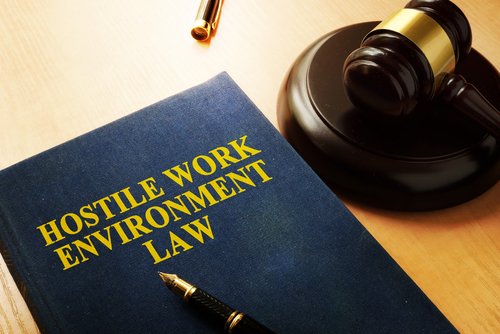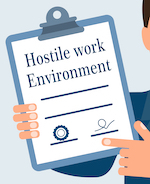Hostile work environment (HWE) is a type of workplace sexual harassment in Nevada. It is when the harasser subjects the victim to physical or emotional abuse that jeopardizes the victim’s employment or makes it hard to carry out job duties.
Depending on the case, victims have the option to file a state or federal claim to recover damages for:
- pain and suffering (including emotional distress);
- back pay and front pay;
- doctors and therapy bills;
- attorney’s fees and court costs; and/or
- other compensatory damages for out-of-pocket costs
If the case reaches trial, the judge might order the employer to pay punitive damages, which can be far greater than compensatory damages. However, most hostile work environment cases can reach a favorable resolution through human resources or mediation.
In this article, our Las Vegas Nevada labor law attorneys discuss:
- 1. Definition of hostile work environment in Nevada
- 2. Filing a sexual harassment claim in Nevada
- 3. Damages
Go back to our main article on workplace sexual harassment in Nevada. Also see our article on quid pro quo sexual harassment in Nevada.

1. What is the definition of hostile work environment in Nevada?
Sexual harassment is forbidden in Nevada by Title VII of the Civil Rights Act of 1964 and Nevada state law. Hostile work environment sexual harassment occurs the harassment prevents the victim from performing his/her job duties or endangers the victim’s job.
Example: Jenny is a secretary. One of her job duties is to make copies of documents. Whenever she goes to the copy room, her boss stands by the copier and says he likes to watch her load the machine. This causes Jenny to avoid using the copier even though it’s part of her job. The boss is creating a hostile work environment.
Hostile work environment is sexual harassment even if the victim does not ultimately lose the job or money.1
2. How do I file a sexual harassment claim in Nevada?
Whenever feasible, hostile work environment victims should tell human resources about the problem. But if HR cannot fix the issue, then the victim may file a claim with either of these administrative agencies:
- Nevada Equal Rights Commission (NERC), or
- Equal Employment Opportunity Commission (EEOC)
The NERC website has instructions for filing an employment discrimination claim in Nevada. And the EEOC website has instructions for filing an employment discrimination claim in Nevada.
Victims usually have 300 days following the harassment to file a claim with the NERC or EEOC, but the time limit may be shorter. Consequently, victims should consult an attorney about the case as soon as possible. Victims should also preserve any evidence, such as recordings and emails.
2.1. Mediation
The NERC and EEOC often attempt to resolve a case through mediation with a trained mediator. Even though mediation is not mandatory, it could expedite reaching a settlement and keep legal fees low. Learn more about NERC mediation services and EEOC mediation services.
2.2. Settling the claim

If mediation does not go forward or fails, then the administrative agency (NERC or EEOC) will start to investigate the case, specifically:
- the nature of the sexual advances,
- the context in which the alleged incidents occurred, and
- the severity and pervasiveness of the sexual conduct2
If the agency comes to determine that no harassment took place — or if the parties do not settle — the agency will issue the claimant a “right to sue” letter.
If the case does settle, the claimant could have to sign papers immunizing the employer from future harassment lawsuits.
2.3. Filing a lawsuit
When the NERC or EEOC cannot settle the case, the claimant can then sue the harasser and/or the employer. Usual claims in these types of cases are:
- intentional infliction of emotional distress;
- battery; and/or
- defamation
In the rare instance that the case does not settle and reaches trial, the victim (the plaintiff) would have the burden to prove by a preponderance of the evidence that the alleged harasser was liable.3
3. What damages can I recover?
Whenever a hostile work environment trial resolves with the plaintiff’s victory, he/she be able to recover compensatory damages to pay for:
- back pay;
- front pay;
- emotional distress and out-of-pocket costs; and/or
- punitive damages
The defendant may also have to pay the plaintiff’s attorney’s costs and fees. And if the plaintiff was fired or demoted, the court may be able to reinstate the plaintiff.
3.1. Back pay
Back pay or wages is all the money — including tips and benefits — that the plaintiff lost out on because of the harassment. However, the court may reduce the back pay awards if the plaintiff never made a good faith effort to find other work.

3.2. Front pay
Loss of future earnings includes all the money the plaintiff is likely to lose out on due to the harassment. Some factors the court considers are:
- the plaintiff’s age,
- the challenge of finding a similar job,
- the length of the plaintiff’s employment, and
- how long the plaintiff probably would have worked for the defendant but for the harassment
3.3. Emotional distress and out-of-pocket costs
The judge may order the defendant to pay for the plaintiff’s:
- emotional distress (a.k.a. “pain and suffering”),
- reputational harm,
- doctor’s bills (such therapy pills), and/or
- costs of searching for another job
Plaintiffs are advised to keep receipts of all their expenses to prove these damages.4
3.4. Punitive damages
Finally, the court may award punitive damages to punish the defendant for the harassment if it was egregious enough. Depending on the case, punitive damages can be three times (or more) than the amount of the compensatory damages.
Call a Nevada labor law attorney…
If you are a victim of hostile workplace environment harassment in Nevada, phone our Las Vegas labor law attorneys for a free consultation. We may be able to help you file a claim or sue the employer in pursuit of large financial damages.
Do you work in California? See our article on California hostile work environment laws.
If you are facing sexual harassment allegations, call our Las Vegas criminal defense lawyers to discuss your case for free. We may be able to negotiate with the prosecutor to have the charges reduced or dismissed. We are also ready to take your case to trial and fight for a “not guilty” verdict.
Legal References
- Title VII of the Civil Rights Act of 1964; NRS 613.330; See Ellison v. Brady, 924 F.2d 872 (9th Cir. 1991).
- Facts About Sexual Harassment, NERC.
- See Allum v. Valley Bank, 114 Nev. 1313, 970 P.2d 1062 (1998).
- Facts About Sexual Harassment, NERC.

